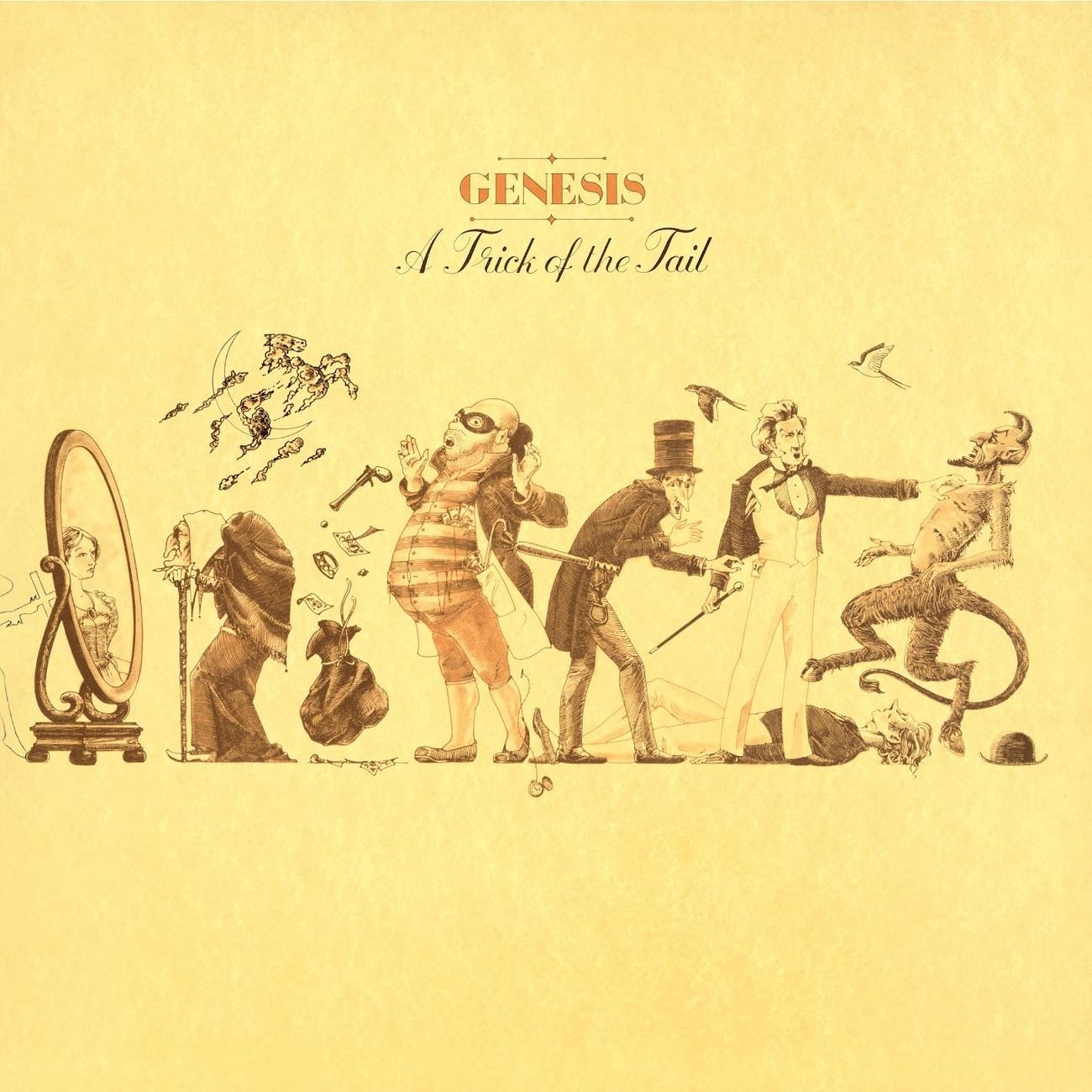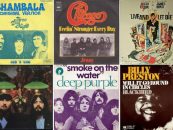 Peter Gabriel’s last show as Genesis’ lead singer was May 22, 1975, in Besançon, France. His bandmates had known for months he was quitting the group, but they kept the news out of the press, and completed their world tour supporting the ambitious double-album The Lamb Lies Down on Broadway. The next steps for drummer Phil Collins, bassist/guitarist Michael Rutherford, keyboardist Tony Banks and guitarist Steve Hackett were unclear. Would the band stay together or not?
Peter Gabriel’s last show as Genesis’ lead singer was May 22, 1975, in Besançon, France. His bandmates had known for months he was quitting the group, but they kept the news out of the press, and completed their world tour supporting the ambitious double-album The Lamb Lies Down on Broadway. The next steps for drummer Phil Collins, bassist/guitarist Michael Rutherford, keyboardist Tony Banks and guitarist Steve Hackett were unclear. Would the band stay together or not?
Hackett went into Kingsway Recorders in London almost immediately to record a solo album (Voyage of the Acolyte, released in October of that year). With Genesis in limbo, Rutherford and Collins were there to help out. When Genesis at last convened at London’s Trident Studios in the autumn, they were toying with the idea of becoming a completely instrumental band. Their co-producer David Hentschel, who’d worked with them as tape operator and engineer for years, was supportive of whatever they wanted to do.
A Melody Maker advertisement announcing auditions for a “Genesis-type group” had drawn a large number of applicants, but few seemed suitable to replace Gabriel, whose theatrical panache and flexible voice had become, in the words of Banks, “our logo.” Working vocalists like Colin Blunstone (The Zombies) and Mick Rogers (Manfred Mann’s Earth Band) were briefly considered, as was, according to one unsubstantiated account, Nick Lowe of Brinsley Schwarz.
The singer Mick Strickland made the initial cut, and was invited to Trident to assay the new song “Squonk,” but it wasn’t in a comfortable key for him, and he was quickly rejected as well. A collective frustration led to Collins, who had done some light singing in the band already, and as a teenager had played the Artful Dodger in a production of Oliver!, to attempt the lead vocal on “Squonk” himself. He did well enough that the sessions continued with Collins singing whatever lyrics were proffered, while he mostly held down his post at the drumkit. Collins later said that he figured they’d find a real lead singer by the time they hit the road again.
Banks was focused on making the new music equal to that made with Gabriel, who remained a good friend. “If it isn’t, we won’t play again,” he told a journalist just before entering Trident Studios. “If it’s not as good, there’s no point in playing. Peter left and life goes on. We were all sort of sad. We spent some time trying to make him change his mind, but when he didn’t, we just carried on. We’ve always had confidence in our own abilities, but we’re apprehensive about whether audiences will accept us without Peter.”
Released in late February 1976, A Trick Of The Tail proved that far from being over, Genesis was set to achieve commercial and artistic successes beyond what they’d accomplished during the Gabriel years. The opening track, “Dance on a Volcano,” immediately announced that strong melodies, dramatic dynamics, majestic classical flourishes and intimate vocals were still in full force. “Holy mother of God/You’ve got to go faster than that to get to the top,” sings a double-tracked Collins at the start.
Time signatures ricochet, multiple keyboards (including synthesizers and mellotron) and 6- and 12-string guitars interweave. Chunky bass and muscular drumming negotiate some spectacular rhythm accents. It’s a kaleidoscopic, virtuosic group performance, developed out of a jam session in the studio at the start of sessions. You can hear the confidence driving the band to believe it could write the bulk of a crucial album on the fly.
The composition of “Entangled” began with Hackett’s 3/4-time guitar figure, to which Banks added a chorus section, Hackett’s lyrics carried upward magnificently by Collins: “Well, if we can help you we will/You’re looking tired and ill/As I count backwards/Your eyes become heavier still.” Some delicate chiming percussion is added to Banks’ harpsichord-like keyboard, and he also adds an ethereal, theremin-like synth solo that fills the final minute. The mellotron, imitating a human vocal chorus, joins for a dramatic conclusion. Banks often identifies “Entangled” as his favorite track on the album.
“Squonk,” credited to Rutherford/Banks, has been described by Collins as “our Led Zeppelin moment.” Taking off from “Kashmir” and “When The Levee Breaks,” it sounds unlike either, but Collins is clearly thinking of John Bonham in his booming rhythm. Banks’ keyboards harken back to the band’s solid prog-rock days of “Watcher of the Skies” and “Supper’s Ready,” and the Rutherford/Hackett interaction is again a master class in arranging. Every inch of its 6:30 length contains something interesting, and when Banks’ organ launches yet another gorgeous melody in the last moments, the fade feels too soon. The lyrics refer to the mythical animal that dissolves into a pool of tears when captured. “Squonk” is one of the tracks that suggested to the Hipgnosis album cover design crew that a “storybook” theme would be a way to convey the feel of the album.
Banks’ solo composition “Mad Man Moon” is the most overlooked track on A Trick of the Tail, maybe because in many ways it’s the most conventional performance on the disc, and a bit too unfocused. Banks says he wanted it to sound “unusual but not weird,” and it certainly gives him a showcase, with a full display of mellotron, synth and piano expertise. Collins gets to add some xylophone, and he sings it perfectly, but there’s something unconvincing about the upbeat, dramatic section about five minutes in that starts “Hey man/I’m the Sandman.” As the second-longest track on the album, it drags too much, and brings side one of the LP to a close.
The rousing “Robbery, Assault and Battery” launches side two with Collins in Artful Dodger mode for a tale he devised with Banks. Using a put-on Cockney accent (he was born in Chiswick, not the East End, of London), Collins shows the wit that allowed him to truly become a “front man” when Genesis toured A Trick of the Tail in ’76, with Bill Bruford drumming whenever Collins needed to be at the microphone. Again, the whole band contributes backgrounds of spectacular coloration and invention.
“Ripples,” credited to Rutherford and Banks, is over eight minutes long, and justifies every second, from the delicate baroque opening, through the soaring chorus of “Sail away, away/Ripples never come back,” to the mid-point switch to an instrumental cinematic landscape. Hackett’s backward-sounding guitar, Banks’ trumpeting synth, and the solid drum/bass lock-in eventually winds back to another chorus, this time underpinned by every emotional hook in the Genesis repertoire. No wonder “Ripples” remained in Genesis’ live sets for decades.
The album’s title track is a jaunty Banks-penned piece, which Collins again superbly acts out. The vocal arrangement is outstanding, unlike anything else on the album: listen to what happens around the first iteration of the lyrics “Am I wrong to believe in a city of gold/That lies in the deep distance.” This is the song that points to hit singles in the band’s future, like “Follow You, Follow Me,” “Misunderstanding” and “That’s All.” “A Trick of the Tail” was released as the B-side to the album’s only 45rpm single, “Entangled,” but neither scored any pop radio success at the time.
The instrumental “Los Endos,” inspired by Santana’s “Promise of a Fisherman,” ends the album, and manages to reference “Squonk” and “Dance on a Volcano” for a nice circular conclusion to the disc. Collins even sings a couple of lines from “Supper’s Ready” in a nod to Gabriel before it’s over. It’s a full-band composition, and shows what Genesis would have sounded like had they dumped the whole idea of having a singer—still damn good. “Los Endos” meshes with the “classic” Gabriel-era Genesis perfectly, and serves as a message to their fans that they’re not going to jettison anything that made them previously beloved, but rather add to their legacy and keep moving forward. It’s been a highlight of their live performances ever since.
Watch Genesis perform “Los Endos” live in 1976
Music critics and the public loved the album, and it got solid FM airplay in the U.S. and U.K. Three promotional films were made, for “Robbery, Assault and Battery,” “Ripples” and the title track, which helped spread the word. A Trick of the Tail sold well, although it peaked at #31 on the Billboard album chart and wasn’t officially certified as “gold” in America until 1990. The subsequent North American tour started with Collins nervous at first and triumphant after—he’d proven himself capable of being out front.
“The visual show has always been the trimmings,” he told a journalist during the tour. “That’s the least important aspect of what we’re about. Recording good music and the playing of the music is the most important thing. The presentation was the icing on the cake. A Trick of the Tail is a typical Genesis album but the major change is that it has a much stronger appeal than any other.”
Related: Our Album Rewind of Gabriel’s final LP with Genesis, The Lamb Lies Down on Broadway
Genesis’ extensive recording catalog is available in the U.S. here and in the U.K. here. Peter Gabriel’s final album with Genesis, 1974’s The Lamb Lies Down on Broadway, is getting a Super Deluxe Edition in 2025.






8 Comments so far
Jump into a conversationBill Bruford on drums for this tour along with Collins.. The last great Genesis album. They went way too pop for me, not like this kind of music at all.
Wind in Wuthering is by far better than Trick of the Tail. But agreed the magic ended when Hackett left and not Gabriel.
Superb review!
I cannot stand Robbery or the Trick of the Tail song after listening for 40 plus years. We love Mad man Moon and completely disagree with the idea it is too long (cut Robbery Assault and Battery). Wind in Wuthering is the last great Genesis album. When Hackett left the magic was in his suitcase. The Lamb was the last great Peter Gabriel album including all solos he did. There are radio listeners who would say but what about the HITS?? I say to them ” how many disco songs are on your playlist now?”
I hear you, Mad Man Moon is a stand-out track, to call it “overlooked” and “unconvincing” and “conventional” all in one paragraph seems odd to me. Exceptional keyboards from Tony, and Phil’s vocal is one of his best.
Robbery Assault and Battery always seemed like a throwaway tune, basically filler.
Saw this tour at the Fabulous Fox in Atlanta. We were all very impressed with Phil–and his ability to come out front where Peter once stood. Agree with all those who say the band wasn’t the same after Steve left.
Excellent review. A Trick of the Tail is my favorite Genesis album and the title track is my all-time favorite by the band.
I like this review, a lot. Probably because I agree with the bulk of it, so go figure! And I like this album better than any of the Gabriel-led Genesis albums, and possibly better than any of the albums that followed. Dang, looks like I just put this one at the top of my Genesis list, though for years, I’d always thought it was “Abacab”.